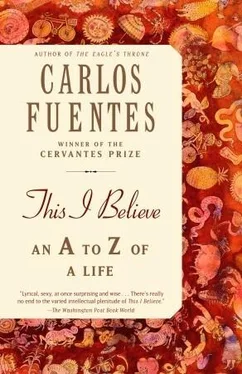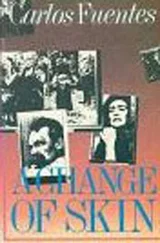These are not useless lessons. The most barren of lands blossom forth suddenly to show us that, insofar as friendship is concerned, one must occasionally allow room for the wisdom of the Proverbs and admit that the wounds of a friend can be faithful ones. And with a friend we can dare to tell him why we do not love him. The enemy, on the other hand, should never be given that satisfaction. But the terrible thing about the loss of friendship is abandoning all those days to which the friend gave meaning. To lose a friend, then, is quite literally to lose time. Excessive expectations, jealousy of someone else’s victories. It is time for a return to friendship but with the knowledge that friendship demands cultivation on a daily basis if it is to bear its marvelous fruits. To establish bonds and enjoy shared affinities. To give each other the gift of serenity. To call for a joyous mutual discipline so as to maintain the friendship. To discover with friends the power of the world and the joy of spending time together. To laugh with friends. To experience friendship as a permanent invitation to accept and to be accepted. And to challenge oneself to try to achieve perfection in friendship and protect it from anything that may attempt to undermine it. To live in the company of friends in such a way that there is never an occasion to feel shame the day after, or to speak ill of those not present. To defend friendship against jealousy, envy, fear. And to agree to disagree: differences should enhance friendship and mutual respect. In an intelligent relationship between friends, there is no place for ambition, intolerance, pettiness. Friendship is dignified modesty, it is imagination and it is generosity. And sometimes — why not? — it is also the exact opposite. Pride. Passivity. Emotional avarice.
I say “passivity” and I am reminded that while dialogue is one of the great joys of friendship, so is silence. This is something I learned through my friendship with Luis Buñuel. At first, whenever he fell silent in the course of our normally animated conversation, I would feel that his lapses were my fault, and I perceived them as reproaches. Eventually I realized that knowing how to be together without saying a word was, ultimately, a superior level of friendship. It was respect. It was reverence. It was reflection as opposed to mere chitchat. We are not, suddenly, parrots. But we will be, if momentarily, philosophers. . After all, weren’t Seneca and the bullfighter Manolete, both from Córdoba, both stoics?
This experience of friendship as reflexive, respectful silence leads me to an inevitable edge in which the borderline between being alone and being with friends is what separates our lives. If friendship is the nexus between the life of community and the life of the self, then the life of the self needs to reclaim solitude from friendship. This is natural: for our inner selves, we demand the passion, intelligence, or love that we recognize in the gaze of a friend. But affection and gestures that invite closeness have a limit: me. I return to myself, to my own despair but also to my own power. I remember with great nostalgia the dawn of childhood, shared among friends. How difficult it is to maintain friendships as adults! I relive the moments of rifts with an inevitable sense of pain. The hours are not the same. The paths have taken odd turns. But I cannot avoid the charity that the self, sooner or later, asks of Fortune. After all, didn’t we already know, from the very beginning of the friendship, that one day it would end? Haven’t we always known that with intimate anxiety, almost with shame, we carried with us an imperfection that we would never be able to share with anyone, not even our closest and most trusted confidant?
And so, paradoxically, we offer the world our imperfection and society our shame — all in the hope that another kind of friendship, that of belonging to life in the community, will redeem us. The artist, by definition, learns very early on to endure solitude for the sake of his artistic creation. But in a broader sense, friendship is what forces us not only to recognize our limits but to realize that we share those limits. We are friends in the community: we need one another. With good reason Thoreau once said that he had but three chairs in his house: one for solitude; the second for friendship; the third for society. Knowing how to be alone is the essential and life-enhancing counterpoint to friendship. So is death. Just as I loyally remember my friends from the remotest reaches of my childhood, I also dedicate an unflinching memory to those old friends, long gone, who were also my teachers at some earlier point in my life. My generation recalls, with Latin verecundia, two great teachers of our youth. Alfonso Reyes of Mexico and Manuel Pedroso of Spain. Two wise men who were also friends. Their intellectual lessons were inseparable from their fraternal ones. They never expected, as false teachers do, idolatry without contradiction. They hoped for and sought the reconquest of youth from old age and in exchange offered us the conquest of fraternal knowledge and experience. With Reyes, small and rotund, and with Pedroso, tall and angular, we discovered over and over again that friendship means enduring through old age — or through time itself. That there is always something else to learn in the world. That friendship is reaped because it is sown. That nobody makes friends without making enemies, but that no enemy can ever attain the transcendence of a friend. That friendship is a form of discretion: it does not admit the cruel speeches that speak so ill of the person who utters them, nor the gossip that turns everything it touches to rubbish. (As La Rochefoucauld said, it is more shameful to mistrust friends than to deceive them.) Friendship, to be intimate, should show us the path of respect and distance, even if it tells us to love and detest the very same things.
In this way, the stages of life come to be measured by the degrees of close affinities we maintain from one age to the next. We forget about friends that are distant in time. We slowly let go of childhood friends who did not grow at the same pace as we did. We court younger friends to acquire the vitality that grows increasingly elusive to us in biological terms. We search for lifelong friends and yet now we have nothing to say to them. We witness the decline of old, beloved friends we no longer recognize or who may no longer recognize us. But when age creates distances, it is only because it is waiting for us. Once again, the bright lights of early youth shine in the twilight hour. In the middle of a distant fog, perhaps, we remember the complicity, we discover together all that exists, we reconquer youth, and become once again banda, cuatiza, chorcha, patocha, barra, posse, gang. Once again we reap passions and vanquish rebellions. And with nostalgia, we look upon the ancient hours of friendship as if they never really existed at all. .
In the course of my lifetime, four political and socioeconomic themes have captured the world’s attention. From 1928 to 1939, it was revolution, fascism, and economic crisis. For Piers Bren-don, of Cambridge University, it was the age of the “dark valley.” Eleven years in which stupidity and evil fought for qualifiable supremacy. Evil was personified by the ascendant totalitarianism of the day: fascism in Italy, national socialism in Germany, militarism in Japan, Stalinism in Russia. The stupidity, blind cowardice, and elegant caution of the European democracies, France and England. The testing ground, as well as the battleground, was the terrible Spanish Civil War, the arena of all the bravery and all the cowardice, all the glory and all the misery of what Eric Hobsbawm has called “the shortest century.” From this terrible decade the United States of America was the country that came out best. Faced, as was the rest of the world, with economic depression, inflation, unemployment, and capitalism in crisis, Franklin D. Roosevelt’s New Deal did not have to appeal to Stalinist or Hitlerian totalitarianism. It summoned human capital, democratic imagination, the social dynamic.
Читать дальше












